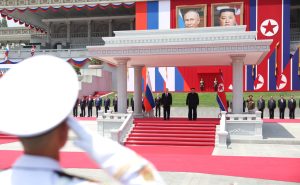The Russian invasion of Ukraine has presented an unprecedented strategic opportunity for North Korea, as it creates conditions for a transactional relationship between the two. This relationship is sustainable as long as the war in Ukraine continues.
The Hanoi summit in 2019 did not yield the results that North Korea had hoped for – an easing of sanctions without renouncing its nuclear and missile program. Pyongyang then turned to its dormant ally, Russia.
After Russia’s full-scale invasion of Ukraine began in February 2022, bilateral contacts between Moscow and Pyongyang have drastically increased both at the top level and among Russian and North Korean officials, expanding practical cooperation between the two. These meet-ups set the stage for a troubling exchange: ammunition for food and military know-how.
Shells are key to Russia’s war efforts, and its artillery-centered armed forces require adequate and sustainable supplies of ammunition to maintain its offensive. Pyongyang has become a key supplier of the needed ammunition. Since 2023, North Korea has dispatched an estimated total of 6,700 containers of ammunition by sea and by railway. In return, Pyongyang has the opportunity to gain resources and achieve important strategic advantages.
For North Korea’s military-industrial complex, this collaboration creates a self-perpetuating cycle: with Russia providing hard currency and raw materials, the North Korean arms industry can increase its capacity and provide more ammunition for Russia. This is not only a blatant violation of international sanctions, but it also has direct security implications beyond Ukraine.
Kim has repeatedly expressed interest in developing North Korea’s space program to improve intelligence gathering capabilities. Kim and Putin’s meeting in September 2023 at the Vostochny Cosmodrome thus explicitly discussed cooperation in space. North Korea likely received technical assistance from Russia for the successful launch of the reconnaissance satellite Malligyong 1 on November 21, 2023. North Korea has vowed to place still more military satellites into orbit. The attempted launch of a second satellite, Malligyong-1-1, while ultimately unsuccessful, is believed to have incorporated Russian help on rocket fuel and rocket engine technology
Meanwhile, North Korea evidently has a greater appetite for Russian technology beyond space, particularly in intercontinental ballistic missiles (ICBMs) and submarine-launched ballistic missiles (SLBMs). While Russia so far has refrained from supplying nuclear and missile technologies, the risk of technological exchanges in those fields between the two cannot be overlooked. This would make North Korea’s nuclear threats more credible. It is also in line with its Juche philosophy, emphasizing military strength and self-reliance. Stronger deterrence against perceived U.S. aggression would entice Pyongyang to act more confrontationally.
There are also strategic opportunities for Pyongyang beyond a transactional quid-pro-quo in its partnership with Moscow. Russia can reduce North Korea’s reliance on China, which has traditionally acted as its economic lifeline. Less dependence on a single partner would grant North Korea more autonomy in its foreign policy and economic decisions.
China has been uncomfortable with some of Pyongyang’s escalatory activities. Actions such as missile launches, nuclear tests, and military exercises automatically invite a stronger U.S. presence on the Korean Peninsula and in the Asia-Pacific. In contrast, Russia, driven by its current needs for the war in Ukraine, has become increasingly acquiescent of North Korean military ambitions.
A closer North Korea-Russia relationship also has significant implications for the dynamics between the two Koreas. Recently, both countries exchanged war threats and resumed hostile activities in the Demilitarized Zone (DMZ) that divides them, while Pyongyang has increased the frequency of missile launches.
At the same time, the North Korean narrative around the South has also been fundamentally redefined. Pyongyang no longer sees South Korea as their compatriots, but rather as the “primary enemy.” It is not by chance that this shift coincides with North Korea’s rapprochement with Russia. It is an opportune moment for Pyongyang to engage in brinkmanship, as Russia’s veto power makes further United Nations Security Council sanctions increasingly unlikely. In the future, Pyongyang could use the threat of escalations with South Korea as leverage to gain favourable concessions.
As long as the war in Ukraine lasts, North Korea-Russia military partnership is here to stay. While Russia gets ammunition for its war in Ukraine; North Korea receives food, military technology, and diplomatic support at the United Nations. More importantly, they are each other’s only possible partner for such a quid pro quo right now.
The coalition between Pyongyang and Moscow will certainly also have far-reaching strategic implications in Europe and Asia-Pacific. Several factors might make China grow increasingly wary of the new developments of the partnership between North Korea and Russia. Amid an emerging military alliance between the two, South Korea might also pivot to directly supplying Ukraine with weapons, which it has so far refrained from doing so.
































